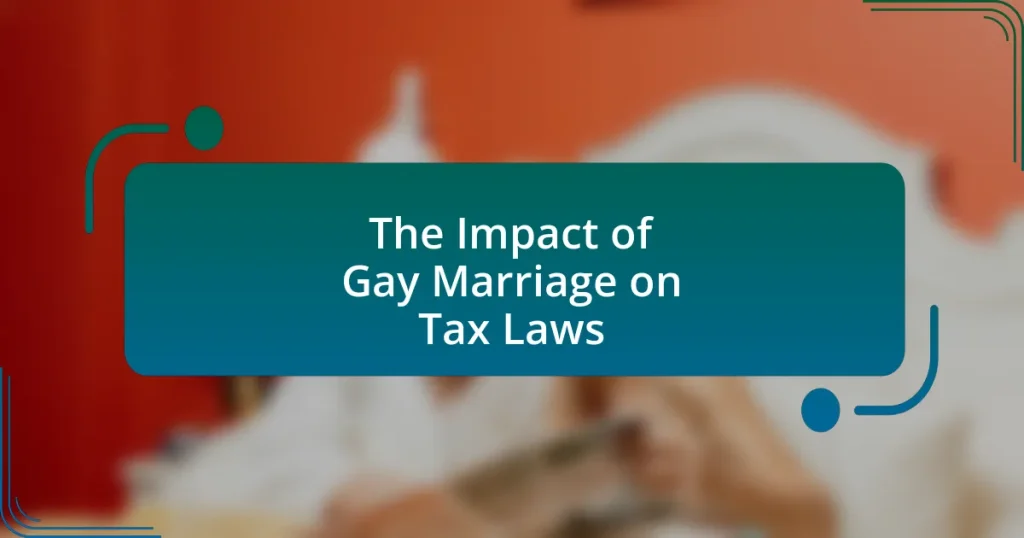The article examines the impact of gay marriage on tax laws, particularly following the Supreme Court’s landmark decision in Obergefell v. Hodges in 2015, which legalized same-sex marriage nationwide. It details how this ruling enabled same-sex couples to access the same tax benefits as heterosexual couples, including the ability to file joint tax returns and claim various tax deductions and credits. The article also explores historical changes in tax legislation, the differences in state and federal tax treatment, and the ongoing challenges same-sex couples face in navigating tax laws. Additionally, it highlights advocacy efforts aimed at improving tax policies and provides practical tips for same-sex couples to maximize their tax benefits.

What is the Impact of Gay Marriage on Tax Laws?
The impact of gay marriage on tax laws includes the recognition of same-sex couples for tax purposes, allowing them to file joint tax returns and access tax benefits previously unavailable to them. Following the Supreme Court’s decision in Obergefell v. Hodges in 2015, which legalized same-sex marriage nationwide, same-sex couples gained the same tax rights as heterosexual couples. This change enables them to benefit from tax deductions, credits, and exemptions, such as the marital deduction for estate taxes and the ability to transfer assets without incurring gift taxes. Additionally, same-sex couples can now claim spousal benefits in retirement accounts and health insurance, further aligning their tax treatment with that of heterosexual couples.
How has the legalization of gay marriage influenced tax legislation?
The legalization of gay marriage has significantly influenced tax legislation by allowing same-sex couples to access the same tax benefits as heterosexual couples. Following the Supreme Court’s decision in Obergefell v. Hodges in 2015, which legalized same-sex marriage nationwide, tax laws were amended to recognize same-sex marriages for federal tax purposes. This change enabled same-sex couples to file joint tax returns, claim spousal exemptions, and access tax benefits related to estate planning and inheritance, which were previously unavailable to them. For instance, the IRS updated its policies to ensure that same-sex couples could benefit from the same tax deductions and credits, such as the Earned Income Tax Credit and the Child Tax Credit, thereby promoting equality in tax treatment.
What specific tax benefits are available to same-sex couples?
Same-sex couples are eligible for several specific tax benefits, including the ability to file joint tax returns, which can lead to lower tax liabilities. This eligibility stems from the Supreme Court’s 2015 decision in Obergefell v. Hodges, which legalized same-sex marriage nationwide, allowing couples to access tax benefits previously reserved for heterosexual couples. Additionally, same-sex couples can benefit from spousal exemptions for estate and gift taxes, enabling them to transfer assets without incurring tax penalties. Furthermore, they can also take advantage of health insurance benefits provided by employers, which may be tax-free for spouses.
How do tax laws differ for same-sex couples compared to heterosexual couples?
Tax laws for same-sex couples differ from those for heterosexual couples primarily in terms of federal recognition and benefits. Following the Supreme Court’s decision in Obergefell v. Hodges in 2015, same-sex couples gained the same federal tax benefits as heterosexual couples, including the ability to file joint tax returns and access to spousal exemptions. Prior to this ruling, many states did not recognize same-sex marriages, leading to discrepancies in tax treatment, such as the inability to file jointly or claim certain deductions. This landmark ruling established that same-sex couples are entitled to the same tax rights and obligations as their heterosexual counterparts, thereby eliminating previous inequalities in tax law.
What are the historical changes in tax laws regarding gay marriage?
The historical changes in tax laws regarding gay marriage primarily began with the Defense of Marriage Act (DOMA) in 1996, which defined marriage for federal purposes as a union between one man and one woman, thereby denying federal benefits to same-sex couples. This changed significantly with the Supreme Court’s decision in United States v. Windsor in 2013, which struck down key provisions of DOMA, allowing same-sex couples to access federal tax benefits. Following this, the IRS announced in 2013 that it would recognize same-sex marriages for federal tax purposes, regardless of the state of residence. The landmark ruling in Obergefell v. Hodges in 2015 further solidified this by legalizing same-sex marriage nationwide, ensuring that same-sex couples could file taxes jointly and receive the same tax benefits as heterosexual couples. These rulings collectively transformed the tax landscape for same-sex couples, aligning it with that of heterosexual couples and affirming their rights under federal law.
What key legal milestones have shaped tax policies for same-sex couples?
The key legal milestones that have shaped tax policies for same-sex couples include the Defense of Marriage Act (DOMA) in 1996, the Supreme Court’s ruling in United States v. Windsor in 2013, and the Obergefell v. Hodges decision in 2015. DOMA defined marriage for federal purposes as a union between one man and one woman, which initially excluded same-sex couples from federal tax benefits. However, the Windsor ruling struck down the federal definition of marriage in DOMA, allowing same-sex couples to access federal tax benefits retroactively. The Obergefell decision further solidified this by legalizing same-sex marriage nationwide, ensuring that same-sex couples are treated equally under tax laws, including eligibility for joint filing and various tax deductions. These milestones collectively transformed the tax landscape for same-sex couples, aligning it with that of heterosexual couples.
How have court rulings affected tax laws related to gay marriage?
Court rulings have significantly impacted tax laws related to gay marriage by establishing legal recognition of same-sex marriages, which allows couples to access the same tax benefits as heterosexual couples. The landmark Supreme Court decision in Obergefell v. Hodges (2015) legalized same-sex marriage nationwide, leading to the Internal Revenue Service (IRS) recognizing same-sex marriages for federal tax purposes. This recognition enables same-sex couples to file joint tax returns, claim spousal exemptions, and access tax benefits such as the marital deduction, which were previously unavailable to them. Consequently, these rulings have aligned tax laws with the legal status of same-sex marriages, ensuring equal treatment under the law.
What challenges do same-sex couples face in navigating tax laws?
Same-sex couples face significant challenges in navigating tax laws primarily due to the complexity and variability of regulations across different jurisdictions. These couples often encounter issues related to filing status, eligibility for tax benefits, and the recognition of their marriage for tax purposes, which can differ based on state and federal laws. For instance, while the 2015 Supreme Court ruling in Obergefell v. Hodges legalized same-sex marriage nationwide, discrepancies still exist in how states treat same-sex couples regarding tax filings and benefits. This inconsistency can lead to confusion and potential financial penalties, as couples may not be aware of their rights or the specific requirements in their state. Additionally, same-sex couples may face difficulties in claiming certain deductions or credits that are more straightforward for heterosexual couples, further complicating their tax situation.
What common misconceptions exist about tax obligations for same-sex couples?
Common misconceptions about tax obligations for same-sex couples include the belief that they do not qualify for the same tax benefits as heterosexual couples. This misconception stems from the historical lack of recognition of same-sex marriages at the federal level prior to the 2013 Supreme Court ruling in United States v. Windsor, which invalidated the Defense of Marriage Act. Following this ruling, same-sex couples are eligible for the same tax benefits, such as filing jointly and claiming spousal exemptions, as their heterosexual counterparts. Additionally, some individuals mistakenly think that same-sex couples must file separately regardless of their marital status, which is incorrect; they can choose to file jointly or separately based on their financial situation.
How can same-sex couples ensure compliance with tax regulations?
Same-sex couples can ensure compliance with tax regulations by accurately reporting their income and deductions, and by understanding their filing options. The IRS recognizes same-sex marriages for tax purposes, allowing couples to file jointly or separately, which can affect their tax liabilities. Couples should also be aware of state-specific tax laws, as some states may have different regulations regarding same-sex marriage. Additionally, keeping thorough records of all financial transactions and consulting with a tax professional can help navigate complex tax situations and ensure adherence to all applicable laws.

How do state and federal tax laws interact regarding gay marriage?
State and federal tax laws interact regarding gay marriage by recognizing same-sex marriages for tax purposes following the Supreme Court’s 2015 decision in Obergefell v. Hodges, which legalized same-sex marriage nationwide. This ruling mandates that federal tax laws treat same-sex couples the same as heterosexual couples, allowing them to file joint tax returns and access tax benefits such as the marital deduction. Additionally, states that recognize same-sex marriage must also comply with federal tax regulations, ensuring that same-sex couples receive equal treatment under both state and federal tax laws. This alignment is crucial for tax equity and reflects the legal recognition of same-sex marriages across the United States.
What differences exist between state and federal tax treatment of same-sex couples?
Federal tax treatment of same-sex couples recognizes their marriages for tax purposes, allowing them to file jointly and access benefits like the marital deduction, following the Supreme Court’s 2013 decision in United States v. Windsor. In contrast, state tax treatment varies significantly; some states fully recognize same-sex marriages and provide similar benefits, while others do not recognize these marriages at all, leading to potential discrepancies in tax liabilities. For example, as of 2023, states like California and New York offer full recognition, whereas states like Texas and Florida do not, creating a patchwork of tax implications for same-sex couples across the country.
How do state tax benefits for gay marriage vary across the U.S.?
State tax benefits for gay marriage vary significantly across the U.S., with some states offering full tax equality while others provide limited or no benefits. For instance, states like California and New York recognize same-sex marriages for tax purposes, allowing couples to file jointly and access various tax deductions and credits. In contrast, states such as Texas and Florida do not offer specific tax benefits for same-sex couples, treating them the same as unmarried individuals, which limits their tax advantages. This disparity is influenced by each state’s laws and policies regarding marriage equality, reflecting broader social and political attitudes towards LGBTQ+ rights.
What role does the Defense of Marriage Act play in tax law?
The Defense of Marriage Act (DOMA) played a significant role in tax law by defining marriage for federal purposes as a union between one man and one woman, which affected the tax benefits available to same-sex couples. This definition meant that same-sex couples were denied federal tax benefits such as the ability to file joint tax returns, claim spousal exemptions, and access tax deductions available to heterosexual couples. The law was enacted in 1996 and remained in effect until it was partially struck down by the Supreme Court in 2013 in United States v. Windsor, which ruled that the federal government could not deny federal benefits to same-sex couples legally married under state law. This ruling led to significant changes in tax law, allowing same-sex couples to access the same tax benefits as heterosexual couples, thereby altering the tax landscape for these individuals.
How do tax implications change with the status of gay marriage?
The tax implications change significantly with the status of gay marriage, as legal recognition allows same-sex couples to file joint tax returns, access spousal benefits, and claim tax deductions unavailable to unmarried couples. Prior to the Supreme Court’s 2015 decision in Obergefell v. Hodges, same-sex couples faced limitations, such as being unable to file jointly or access certain tax benefits, which often resulted in higher tax liabilities. Following this ruling, same-sex couples are treated equally under federal tax law, enabling them to benefit from tax credits, deductions, and exemptions that heterosexual couples have historically enjoyed. This legal recognition has led to a more equitable tax landscape for same-sex couples, aligning their tax obligations and benefits with those of opposite-sex couples.
What happens to tax benefits if a same-sex couple moves to a different state?
When a same-sex couple moves to a different state, their tax benefits may change significantly depending on the laws of the new state. Some states recognize same-sex marriage and provide tax benefits similar to those for heterosexual couples, while others do not recognize same-sex marriage, which can lead to the loss of certain tax advantages. For example, if a couple moves from a state that recognizes same-sex marriage and offers tax benefits, such as joint filing or spousal exemptions, to a state that does not, they may face higher tax liabilities and lose access to those benefits. This variability is rooted in the legal recognition of marriage, which affects tax filing status, deductions, and credits available to couples.
How does divorce impact tax obligations for same-sex couples?
Divorce significantly impacts tax obligations for same-sex couples by altering their filing status and potential tax liabilities. When a same-sex couple divorces, they must change their filing status from “married filing jointly” or “married filing separately” to “single” or “head of household,” depending on their circumstances. This change can lead to different tax rates and eligibility for certain deductions and credits. For instance, the Tax Cuts and Jobs Act of 2017 eliminated personal exemptions, which previously benefited married couples, thus affecting the overall tax burden post-divorce. Additionally, any alimony payments made may be deductible for the payer and taxable for the recipient, further complicating tax obligations.

What future trends can we expect in tax laws related to gay marriage?
Future trends in tax laws related to gay marriage are likely to focus on increased equality and potential simplification of tax benefits for same-sex couples. As societal acceptance of gay marriage continues to grow, lawmakers may introduce measures that further align tax benefits for same-sex couples with those available to heterosexual couples, addressing disparities that still exist in certain jurisdictions. For instance, the U.S. Supreme Court’s decision in Obergefell v. Hodges in 2015 established the legal recognition of same-sex marriage nationwide, which has already led to significant changes in tax filing statuses and benefits. Additionally, ongoing discussions about tax reform may include provisions that enhance the financial rights of same-sex couples, such as equal treatment in estate taxes and retirement benefits.
How might upcoming legislation affect tax benefits for same-sex couples?
Upcoming legislation may enhance tax benefits for same-sex couples by potentially expanding access to tax deductions and credits previously unavailable to them. For instance, if new laws align federal tax codes with state-level protections, same-sex couples could benefit from joint filing statuses, which often result in lower tax liabilities. Historical context shows that the 2013 Supreme Court decision in United States v. Windsor allowed same-sex couples to access federal tax benefits, indicating a trend toward increasing equality in tax laws. Therefore, forthcoming legislation could further solidify and expand these benefits, reflecting ongoing changes in societal and legal recognition of same-sex marriage.
What advocacy efforts are underway to improve tax laws for gay marriage?
Advocacy efforts to improve tax laws for gay marriage include initiatives led by organizations such as the Human Rights Campaign and Lambda Legal, which are actively lobbying for legislative changes. These organizations aim to eliminate tax disparities faced by same-sex couples, particularly regarding federal tax benefits that are not equally accessible to them. For instance, the repeal of the Defense of Marriage Act (DOMA) in 2013 allowed same-sex couples to file joint tax returns, but many tax issues remain unresolved, such as the treatment of inherited assets and benefits under state laws. These advocacy groups are working to raise awareness and push for comprehensive reforms that ensure equitable tax treatment for all married couples, regardless of sexual orientation.
How could changes in societal attitudes influence tax policy?
Changes in societal attitudes can significantly influence tax policy by prompting lawmakers to adjust tax laws to reflect evolving public values and norms. For instance, as acceptance of same-sex marriage increased in the United States, states began to revise tax policies to provide equal treatment for same-sex couples, including tax benefits previously reserved for heterosexual couples. This shift is evidenced by the 2015 Supreme Court ruling in Obergefell v. Hodges, which legalized same-sex marriage nationwide and led to immediate changes in tax filing statuses, inheritance rights, and benefits eligibility for same-sex couples. Consequently, societal acceptance directly correlates with legislative changes that aim to ensure fairness and equality in tax treatment.
What practical tips can same-sex couples use to navigate tax laws effectively?
Same-sex couples can navigate tax laws effectively by understanding their filing options and taking advantage of available deductions and credits. They should consider filing jointly, as it often results in a lower tax liability due to combined income thresholds for tax brackets. Additionally, same-sex couples should be aware of tax benefits related to marriage, such as the ability to transfer assets without incurring gift taxes and eligibility for spousal benefits in retirement accounts.
Furthermore, they should keep detailed records of all income and expenses, as this documentation can support claims for deductions and credits. Consulting with a tax professional who is knowledgeable about the specific implications of same-sex marriage on tax laws can also provide tailored advice and ensure compliance with current regulations. This approach is supported by the IRS’s recognition of same-sex marriages for tax purposes since the 2013 Supreme Court ruling in United States v. Windsor, which invalidated the Defense of Marriage Act.
How can couples maximize their tax benefits under current laws?
Couples can maximize their tax benefits under current laws by filing jointly, which often results in lower tax rates and increased deductions. When couples file jointly, they can access higher income thresholds for tax brackets, allowing them to benefit from a wider range of tax credits and deductions, such as the Earned Income Tax Credit and the Child Tax Credit. Additionally, they can combine their deductions, which may exceed the standard deduction amount, leading to further tax savings. According to the IRS, married couples filing jointly can also take advantage of tax-free transfers of assets between spouses, which can help in estate planning and reducing capital gains taxes.
What resources are available for same-sex couples seeking tax advice?
Same-sex couples seeking tax advice can access various resources, including specialized tax professionals, LGBTQ+ advocacy organizations, and online tax preparation services. Tax professionals with expertise in LGBTQ+ issues can provide tailored advice on tax implications related to marriage, filing jointly, and potential deductions. Organizations such as the Human Rights Campaign and the National Center for Lesbian Rights offer resources and guidance on tax matters specific to same-sex couples. Additionally, online platforms like TurboTax and H&R Block provide tools and information that cater to the unique tax situations of same-sex couples, ensuring they understand their rights and obligations under current tax laws.


